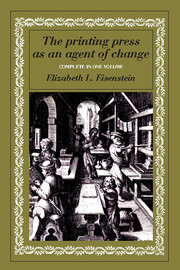Book contents
- Frontmatter
- Dedication
- Contents
- Preface
- Part One Introduction to an Elusive Transformation
- Part Two Classical and Christian Traditions Reoriented; Renaissance and Reformation Reappraised
- Part Three The Book of Nature Transformed
- 5 Introduction; problems of periodization
- 6 Technical literature goes to press: some new trends in scientific writing and research
- 7 Resetting the stage for the Copernican Revolution
- 8 Sponsorship and censorship of scientific publication
- Conclusion: Scripture and nature transformed
- Bibliographical index
- General index
6 - Technical literature goes to press: some new trends in scientific writing and research
Published online by Cambridge University Press: 05 September 2013
- Frontmatter
- Dedication
- Contents
- Preface
- Part One Introduction to an Elusive Transformation
- Part Two Classical and Christian Traditions Reoriented; Renaissance and Reformation Reappraised
- Part Three The Book of Nature Transformed
- 5 Introduction; problems of periodization
- 6 Technical literature goes to press: some new trends in scientific writing and research
- 7 Resetting the stage for the Copernican Revolution
- 8 Sponsorship and censorship of scientific publication
- Conclusion: Scripture and nature transformed
- Bibliographical index
- General index
Summary
BRIDGING THE GAP BETWEEN TOWN AND GOWN
It is worth pausing over the fact that a new kind of collaborative venture in data collection had been set in motion even before laboratory facilities were built or new observational instruments had been invented. The shift from script to print helps to explain why old theories were found wanting and new ones devised even before telescopes, microscopes, and scientific societies had appeared. Gutenberg's invention not only preceded Galileo's tube; it was a more versatile aid and affected a wider range of data. Some professors shunned controversy and withheld treatises from the press just as some refused at first to look through the telescope. But none failed to consult printed reference guides or preferred to have to copy out tables by hand. Whatever views were held concerning Aristotle, Ptolemy or Galen, whatever objections were posed against using vernaculars or courting publicity; printed maps, charts, and diagrams found rapid acceptance from all. Indeed Latin-reading professional groups profited from new kinds of book learning just as much as did untutored artisans. In view of the many new printed treatises that William Gilbert consulted, for example, it is somewhat misleading to describe De Magnete as being based ‘Only on observations and experiment.’ Gilbert probably gleaned as much useful data from reading technical works composed by others as from observing and experimenting on his own. That Tycho Brahe and Isaac Newton could learn so much by reading on their own also had significant consequences for their work.
- Type
- Chapter
- Information
- The Printing Press as an Agent of Change , pp. 520 - 574Publisher: Cambridge University PressPrint publication year: 1980



